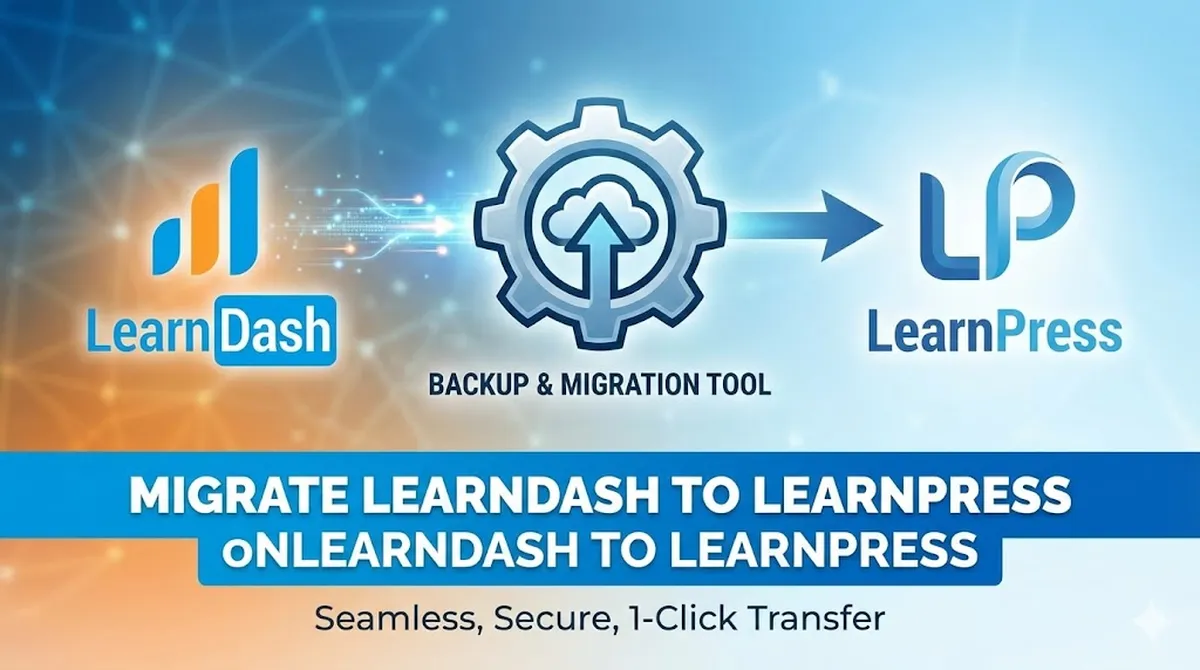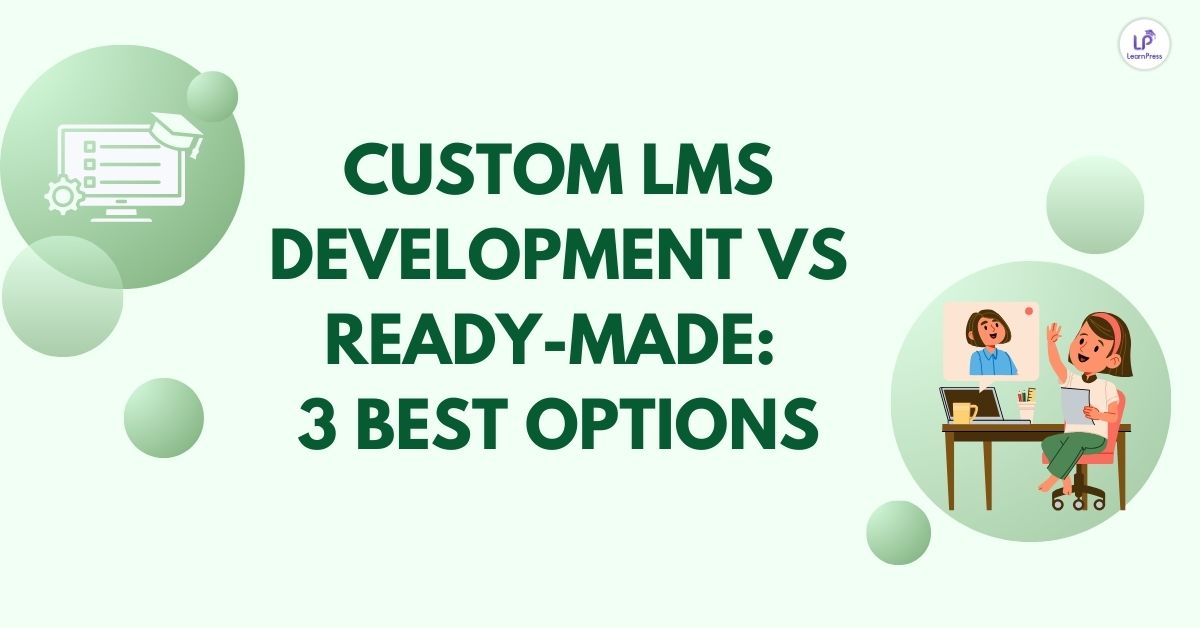Choosing the best eCommerce platform is a pivotal decision for any business looking to build or grow its online presence. With countless options on the market, pinpointing the perfect solution tailored to your goals can feel overwhelming. Whether you’re selling physical products, offering services, or delivering digital content like online courses, the right eCommerce platform will be the foundation of your success.
This guide explores six leading eCommerce platforms that offer powerful features to help you achieve your business goals. If you’re looking to create an online learning platform or expand your business with LMS tools – potentially leveraging the power of LearnPress for seamless course management – we’ve got you covered with suitable options. Let’s delve into the details to find the perfect fit for your business, especially if you’re seeking the best eCommerce platform for small businesses.
Let’s dive in and explore the 6 Best Ecommerce Platforms For Selling Digital Products in this article!
Table of Contents
LearnPress – WordPress LMS Plugin
We provide an amazing WordPress LMS plugin to create & sell online courses. Let’s find out!
Try Now1. WooCommerce
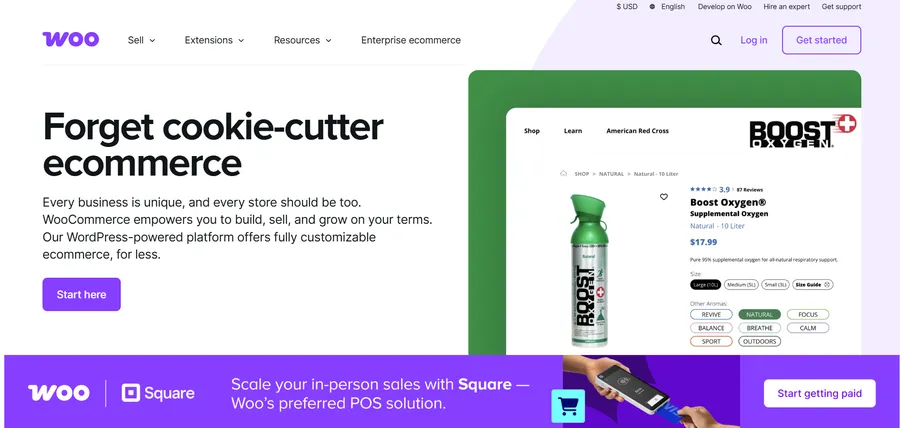
WooCommerce is a highly popular, open-source WordPress plugin, celebrated for its affordability and flexibility. It’s one of the best eCommerce platforms for small businesses looking for an easy-to-use online store builder. With its vast selection of extensions and themes, WooCommerce empowers users to craft unique online stores tailored to their specific needs.
eCommerce Features:
- Free Core Plugin: The WooCommerce plugin itself is free, making it an attractive option for budget-conscious businesses.
- Extensive Customization: A wide array of extensions and themes offers limitless possibilities for tailoring your business to your specific requirements.
- Multiple Payment Gateways: WooCommerce supports various payment processing gateways, providing customers with diverse payment choices.
- Vibrant Community: A thriving community offers support and resources for users of all levels.
Why Choose WooCommerce?
WooCommerce is an affordable, highly customizable eCommerce platform ideal for small businesses. Its free core plugin and affordable extensions provide excellent value for money. With support for multiple payment gateways and a vibrant community, it ensures flexibility and reliable support. As your business grows, WooCommerce scales easily to meet your evolving needs.
Pros:
- Highly Customizable: WooCommerce offers extensive customization options, allowing you to adapt your online store exactly to your vision.
- Cost-Effective: The base plugin is free, and you can expand functionality through affordable extensions.
- Extensive Payment Processing Options: WooCommerce supports a variety of payment methods, including PayPal, Stripe, and many others.
Cons:
- Requires Technical Knowledge: Setting up advanced customizations can require technical expertise, which may be challenging for beginners.
- Additional Costs for Extensions: While the core plugin is free, you may need to purchase additional extensions to unlock more features.
Pricing:
WooCommerce is free to install and use, making it an affordable option for businesses. However, additional features and functionalities are available through paid extensions, which can add to the overall cost. Hosting and premium themes are also additional expenses to consider.
2. BigCommerce
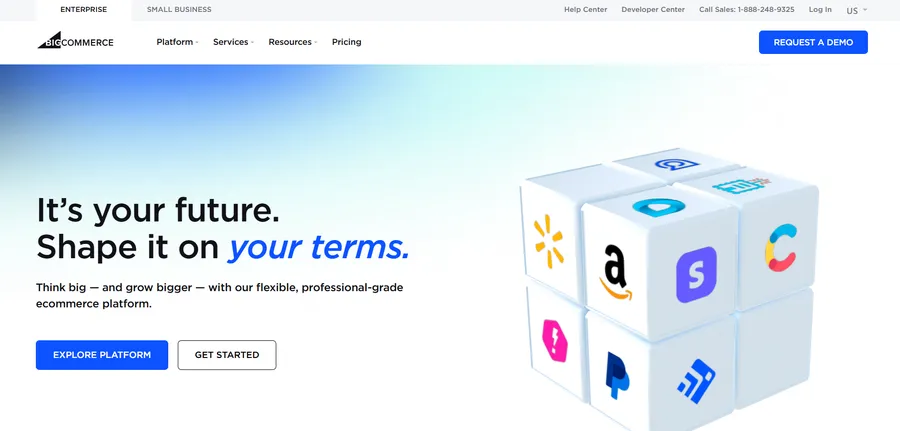
BigCommerce is a powerful eCommerce platform designed to help businesses grow at scale. This hosted solution provides an easy-to-use interface with advanced features for managing large-scale operations. BigCommerce is ideal for businesses that need to sell across multiple sales channels and offer a range of products.
eCommerce Features:
- Drag-and-Drop Page Builder: Customize your store with an easy-to-use drag-and-drop editor.
- Optimized Checkout: Streamlined payment processing for a smooth customer support experience.
- Multi-Storefront Management: Manage multiple stores from a single platform.
- B2B Edition: Built-in features tailored for B2B transactions.
Why Choose BigCommerce?
BigCommerce is one of the best eCommerce platforms for small businesses that need robust features for scalability and multi-channel selling. It’s especially ideal for businesses that plan to expand and need an online store builder with enterprise-grade functionality.
Pros:
- Scalable Features: BigCommerce is perfect for businesses with high growth potential.
- Comprehensive Support: Access 24/7 customer support and extensive resources.
- Multi-Channel Selling: Easily connect your store to platforms like eBay, Amazon, and social media sales channels.
Cons:
- Learning Curve: BigCommerce’s extensive features can be overwhelming for beginners, making it more difficult to get started compared to simpler platforms like Shopify.
- Limited Customization on Lower Plans: While BigCommerce offers great functionality, the customization options on lower-tier plans are somewhat restricted, requiring an upgrade for more advanced features.
- Transaction Fees on Some Plans: Although BigCommerce doesn’t charge transaction fees on all plans, certain pricing tiers do, which can add additional costs for businesses with high sales channels volumes.
Pricing:
BigCommerce offers a 15-day free trial, allowing you to explore the platform with no commitment. After the trial, plans start at $29 per month for small businesses, with custom pricing available for enterprises looking for more advanced features and scalability.
3. Adobe Commerce (Magento)

Adobe Commerce, formerly Magento, is a highly customizable eCommerce platform ideal for enterprises and businesses with complex needs. It allows for extensive integration with other Adobe products, making it a compelling choice for large-scale operations.
eCommerce Features:
- Drag-and-Drop Page Builder: Create and design your store visually without needing coding skills.
- Adobe Integration: Seamlessly connect with Adobe Experience Manager, Analytics, and Real-Time CDP for advanced personalization.
- Multi-Store Management: Operate multiple stores from a centralized platform.
- B2B Functionality: Features dedicated to handling B2B transactions.
- Advanced Reporting: Get in-depth reports on store performance and customer support behavior.
Why Choose Adobe Commerce?
Adobe Commerce offers custom pricing tailored to your business needs. To get a personalized quote, you’ll need to contact Adobe directly. This allows you to choose a plan that fits the specific requirements and scale of your business.
Pros:
- Highly Customizable: Offers extensive customization options to build your store exactly how you want.
- Seamless Adobe Product Integration: Easily integrate with other Adobe products for enhanced marketing and personalization.
- Enterprise-Grade Features: Ideal for large businesses or enterprises with complex eCommerce platform needs.
Cons:
- Complex Setup: Setting up and maintaining Adobe Commerce requires significant technical expertise, making it difficult for users without development knowledge to manage the platform efficiently.
- Expensive: Adobe Commerce is one of the most expensive platforms, with high licensing and maintenance costs, making it less suitable for small businesses or startups with limited budgets.
- Resource Intensive: The platform requires a powerful hosting environment and consistent performance monitoring, which can add to operational costs and complexity.
Pricing:
Adobe Commerce offers custom pricing tailored to your business needs. To get a personalized quote, you’ll need to contact Adobe directly. This allows you to choose a plan that fits the specific requirements and scale of your business.
4. Shopify

Shopify is one of the best eCommerce platforms for small businesses looking for a fast and easy way to sell online. Shopify provides a comprehensive online store builder, enabling entrepreneurs to create beautiful and functional online stores without needing any coding knowledge.
eCommerce Features:
- Vast App Store: Access over 8,000 apps to enhance your store’s functionality.
- Multi-Channel Selling: Sell through online marketplaces, social media, and in-person with Shopify POS.
- Beginner-Friendly: Intuitive interface that makes setting up and managing an online store simple.
- Mobile-Optimized: Ensure your store is fully functional and mobile-friendly.
Why Choose Shopify?
Shopify is one of the best eCommerce platforms for small business owners who want an easy-to-use, all-in-one solution for managing their business. With a wide range of customizable themes and built-in tools, Shopify simplifies the process of selling products online, from payment processing to shipping and everything in between.
Pros:
- Easy to Use: Shopify’s simple setup and intuitive interface make it great for beginners.
- Scalable: Shopify grows with your business, offering scalable pricing plans and features.
- Extensive Integrations: Shopify integrates with many third-party apps and services.
Cons:
- Transaction Fees: Shopify charges additional transaction fees unless you use Shopify Payments.
- Limited Customization for Non-Developers: While Shopify is user-friendly, advanced customization may require a developer’s help.
Pricing:
Shopify offers a free trial, allowing you to explore the platform and its features before committing. After the trial, plans range from $19 per month for small businesses to $2,000+ per month for larger enterprises, catering to businesses of all sizes with a variety of features and scalability options.
5. Wix
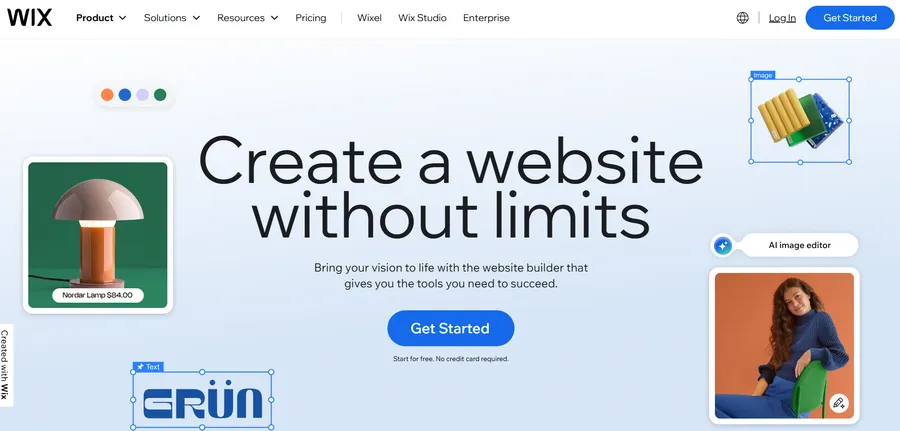
Wix is an online store builder that makes it incredibly easy for anyone to create and manage a store without requiring technical expertise. With its intuitive drag-and-drop builder, Wix allows users to design a store exactly how they envision it, without needing any coding knowledge. Known for its aesthetically pleasing designs and user-friendly interface, Wix has become one of the most popular platforms for individuals and small businesses looking to establish their online presence and sell products with minimal effort.
eCommerce Features:
- Drag-and-Drop Builder: Easily design and customize your business without needing coding knowledge.
- Inventory Management: Keep track of your products and manage orders seamlessly.
- Customizable Templates: Choose from a wide selection of customizable store templates.
Why Choose Wix?
Wix is a great option for small businesses or creators looking for a simple, visually appealing online store. Its payment processing and online store builder features make it easy to start selling quickly, even with no prior experience.
Pros:
- Easy to Use: The drag-and-drop builder makes Wix simple for beginners to use.
- Affordable: Wix offers a free plan and low-cost paid plans for small businesses.
- Beautiful Templates: Offers a wide range of stylish, mobile-responsive templates.
Cons:
- Limited eCommerce Features: The free plan lacks important eCommerce platform features such as payment gateways and analytics, limiting its functionality for serious online stores.
- Lacks Scalability: Wix may not be the best choice for businesses looking to scale quickly, as it can become restrictive as your business grows.
- Transaction Fees on Paid Plans: Even on paid plans, Wix charges transaction fees, which can add up for businesses with high sales channels volumes.
- Limited Customization Options: While Wix offers customizable templates, the overall flexibility is more limited compared to other platforms like Shopify or WooCommerce, especially for advanced users.
Pricing:
Wix offers a free plan that provides basic features, though transaction fees apply for sales made through the platform. For more advanced features such as custom domains and lower transaction fees, paid plans start at $17 per month, offering greater flexibility and functionality for your business.
6. Square Online
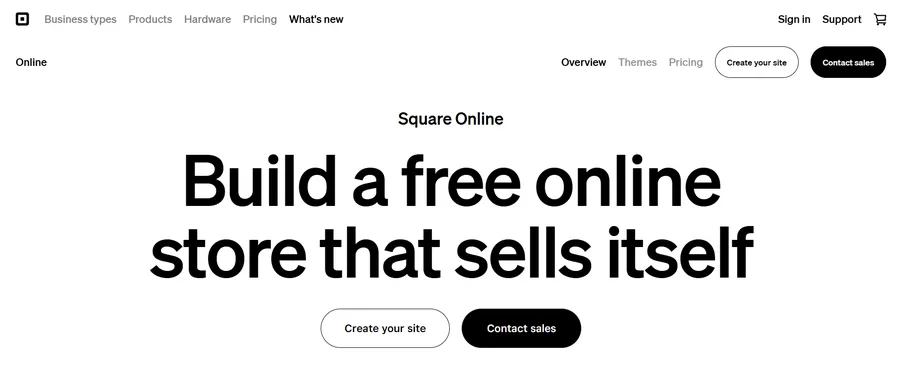
Square Online is a great choice for small businesses looking for a straightforward and affordable eCommerce platform solution. Formerly known as Weebly, Square Online integrates directly with Square’s payment processing system, making it easy to accept payments and manage your online store.
eCommerce Features:
- Free Plan: Build a basic store with no upfront costs.
- Customizable Themes: Choose from a variety of themes to customize your store’s design.
- Inventory Management: Track stock, manage orders, and set up shipping rates.
- Mobile-Friendly: Your store will automatically be optimized for mobile devices.
Why Choose Square Online?
Square Online is one of the best eCommerce platforms for small business owners who need a simple, low-cost solution to build an online store. Its integration with Square’s payment processing system makes it particularly convenient for businesses already using Square for in-person sales channels.
Pros:
- Affordable: The free plan and low-cost paid plans make Square Online a budget-friendly option.
- Seamless Square Integration: Perfect for businesses already using Square for physical transactions.
- User-Friendly: Simple setup and easy-to-use interface.
Cons:
- Limited Features on Free Plan: The free plan offers only basic features, with more advanced options such as custom domains and detailed analytics locked behind paid plans.
- Transaction Fees: Square charges transaction fees, which can add up for higher-volume stores, increasing overall costs.
- Design Limitations: While Square offers templates, customization options are more limited compared to other platforms like Shopify or Wix, especially for users with specific design needs.
- Lack of Advanced eCommerce Tools: Square Online may lack some advanced eCommerce platform features, like robust inventory management or detailed reporting, that other platforms offer in their higher-tier plans.
Pricing:
Square Online offers a free plan that provides basic features, though transaction fees apply for sales made through the platform. For more advanced features such as custom domains and lower transaction fees, paid plans start at $12 per month, offering greater flexibility and functionality for your business.
Conclusion
Choosing the right eCommerce platform is a pivotal decision that lays a strong foundation for your business’s success. Whether you’re looking for a simple online store builder to get started or need powerful features like payment processing and course management, platforms such as WooCommerce, BigCommerce, and Shopify all offer robust tools to meet your needs.
For those specifically looking to sell digital products like online courses, LearnPress, with its Drag and Drop Course Builder, is an excellent option worth considering. For those specifically looking to sell digital products like online courses, LearnPress is an excellent option worth considering. As a powerful WordPress plugin, LearnPress transforms your website into a complete Learning Management System (LMS), allowing you to easily create, manage, and sell courses. When combined with an eCommerce platform like WooCommerce, you’ll have a comprehensive solution to not only manage course content but also handle every aspect of online sales, from marketing to customer support and sales channels management.
With a diverse range of options catering to businesses of all sizes and goals, selecting the right eCommerce platform will help you optimize operations and deliver an exceptional shopping experience for your customers. Carefully consider the features and value each platform provides to find the best eCommerce platform for your small business, supporting sustainable growth and expansion.
FAQs About The Best Ecommerce Platform
Q1. Can I sell digital products using these ecommerce platforms?
Yes, most platforms like Shopify, WooCommerce, and LearnPress allow you to sell digital products, including downloadable courses, ebooks, and software.
Q2. Does Shopify offer a free trial?
Yes, Shopify offers a free trial, allowing users to explore the platform and its features before committing to a paid plan.
Q3. Which eCommerce platform is best for beginners?
For beginners, Shopify is a great choice with its user-friendly interface, easy setup, and integrated features. It’s perfect for those with little technical expertise.
Q4. How do I choose the right ecommerce platform for my business?
Consider your business size, goals, budget, and technical expertise. Look for platforms with the features you need, ease of use, customer support, and customization options.
Q5. What is the best eCommerce platform for small businesses selling digital products?
The best eCommerce platform depends on your specific needs, but WooCommerce, BigCommerce, and Shopify are all strong contenders for small businesses selling digital products.
Read more: 6 Best LMS Platforms for Nonprofits
Contact US | LearnPress:
Website: https://learnpresslms.com/
Fanpage: https://www.facebook.com/learnpresslms
Email: [email protected]

